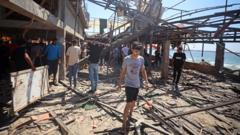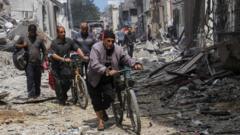In the Donetsk region, Ukrainian soldiers and civilians refute claims of a ceasefire, sharing accounts of continuous bombardments and lack of trust in Russia's intentions. Amidst the horrors of war, they voice concerns over safety and uncertainty for their futures.
Chaos Amid Ceasefire: Perspectives from the Ukrainian Frontlines

Chaos Amid Ceasefire: Perspectives from the Ukrainian Frontlines
As Russia declares a ceasefire, Ukrainian soldiers and civilians express deep skepticism, citing ongoing attacks and distrust.
As the sun set on the Donetsk region of eastern Ukraine, the glimmer of a ceasefire announced by Russia seemed but a mirage. Ukrainian soldiers, hardened by the ongoing conflict, voiced their skepticism regarding the temporary halt to hostilities. They shared their harrowing experiences with international media while stationed at an artillery position near Pokrovsk, a city marred by violence.
"Here, we don’t think about ceasefires," remarked 26-year-old soldier Max, stressing the relentless nature of their duty. Russia's President Vladimir Putin had called for a three-day ceasefire starting May 8—a symbolic nod to Victory Day—and yet, even before the announcement, artillery shells echoed across the region. Soldiers reported attacks throughout the night, including the deployment of glide bombs and drone strikes.
Serhii, another soldier from the National Guard, articulated a sentiment reflected by many on the ground: "There can be no trust in Russia. They announce a ceasefire one moment and attack the next." The realization weighed heavily on them as they prepared their artillery to respond to the provocations, embodying a grim determination to remain combat-ready.
Ukrainian President Volodymyr Zelensky reacted to the Russian ceasefire proposal by dismissing it outright. He called instead for a more substantial ceasefire lasting thirty days, a sentiment echoed by U.S. President Donald Trump, who has indicated that severe sanctions could follow if the truce is disregarded.
In the nearby city of Dobropillya, the atmosphere was equally tense. Civilian life became interwoven with the fear of military escalation. Svitlana, a resident displaced from Pokrovsk, commented, “We hear the explosions here. How can there be a ceasefire?” Her statement captured the collective frustration pervasive among the inhabitants as the sound of conflict loomed ominously in the background.
Among those navigating the emotional toll of this conflict was Oleksandr, a 65-year-old man who voiced his fears of imminent danger. "Last night was quieter, yet I still hear the alarms." Tears welled in his eyes as he shared worries for his family, embodying the uncertainty faced by countless civilians caught in the crossfire.
This disconnect between declared intentions and the reality on the ground embodies a broader narrative of distrust pervading the conflict, exacerbated by ongoing military engagements. As the war drags on, both civilians and soldiers alike are left grappling with the haunting question of safety and survival in a world where truth seems elusive.




















